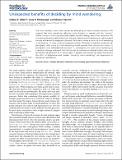Unexpected benefits of deciding by mind wandering
Citation
Giblin, Colleen E., Carey K. Morewedge, and Michael I. Norton. 2013. “Unexpected benefits of deciding by mind wandering.” Frontiers in Psychology 4 (1): 598. doi:10.3389/fpsyg.2013.00598. http://dx.doi.org/10.3389/fpsyg.2013.00598.Abstract
The mind wanders, even when people are attempting to make complex decisions. We suggest that mind wandering—allowing one's thoughts to wander until the “correct” choice comes to mind—can positively impact people's feelings about their decisions. We compare post-choice satisfaction from choices made by mind wandering to reason-based choices and randomly assigned outcomes. Participants chose a poster by mind wandering or deliberating, or were randomly assigned a poster. Whereas forecasters predicted that participants who chose by mind wandering would evaluate their outcome as inferior to participants who deliberated (Experiment 1), participants who used mind wandering as a decision strategy evaluated their choice just as positively as did participants who used deliberation (Experiment 2). In some cases, it appears that people can spare themselves the effort of deliberation and instead “decide by wind wandering,” yet experience no decrease in satisfaction.Other Sources
http://www.ncbi.nlm.nih.gov/pmc/articles/PMC3764397/pdf/Terms of Use
This article is made available under the terms and conditions applicable to Other Posted Material, as set forth at http://nrs.harvard.edu/urn-3:HUL.InstRepos:dash.current.terms-of-use#LAACitable link to this page
http://nrs.harvard.edu/urn-3:HUL.InstRepos:11877040
Collections
- HBS Scholarly Articles [854]
Contact administrator regarding this item (to report mistakes or request changes)



